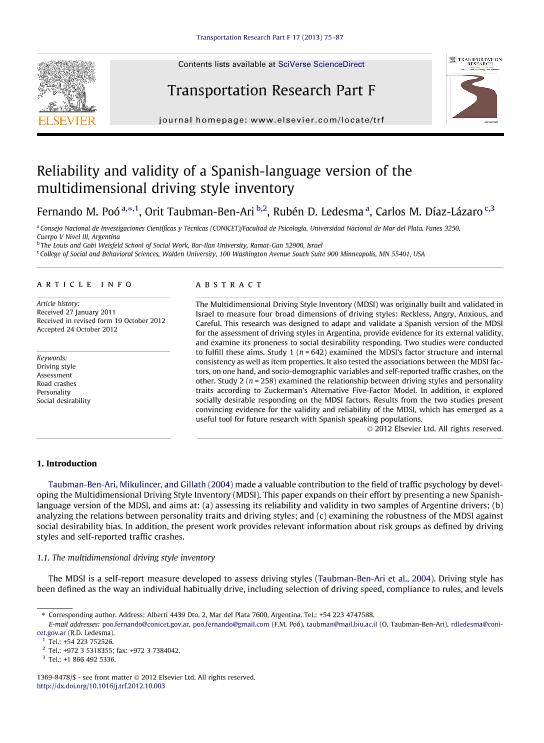Artículo
Reliability and validity of a Spanish-language version of the multidimensional driving style inventory
Fecha de publicación:
02/2013
Editorial:
Elsevier
Revista:
Transportation Research Part F: Traffic Psychology and Behaviour
ISSN:
1369-8478
Idioma:
Inglés
Tipo de recurso:
Artículo publicado
Clasificación temática:
Resumen
The Multidimensional Driving Style Inventory (MDSI) was originally built and validated in Israel to measure four broad dimensions of driving styles: Reckless, Angry, Anxious, and Careful. This research was designed to adapt and validate a Spanish version of the MDSI for the assessment of driving styles in Argentina, provide evidence for its external validity, and examine its proneness to social desirability responding. Two studies were conducted to fulfill these aims. Study 1 (n = 642) examined the MDSI’s factor structure and internal consistency as well as item properties. It also tested the associations between the MDSI factors, on one hand, and socio-demographic variables and self-reported traffic crashes, on the other. Study 2 (n = 258) examined the relationship between driving styles and personality traits according to Zuckerman’s Alternative Five-Factor Model. In addition, it explored socially desirable responding on the MDSI factors. Results from the two studies present convincing evidence for the validity and reliability of the MDSI, which has emerged as a useful tool for future research with Spanish speaking populations.
Palabras clave:
ASSESSMENT
,
DRIVING STYLE
,
PERSONALITY
,
ROAD CRASHES
,
SOCIAL DESIRABILITY
Archivos asociados
Licencia
Identificadores
Colecciones
Articulos(CCT - MAR DEL PLATA)
Articulos de CTRO.CIENTIFICO TECNOL.CONICET - MAR DEL PLATA
Articulos de CTRO.CIENTIFICO TECNOL.CONICET - MAR DEL PLATA
Citación
Poó, Fernando Martín; Taubman Ben Ari, Orit; Ledesma, Ruben Daniel; Díaz Lázaro, Carlos M.; Reliability and validity of a Spanish-language version of the multidimensional driving style inventory; Elsevier; Transportation Research Part F: Traffic Psychology and Behaviour; 17; 2-2013; 75-87
Compartir
Altmétricas




